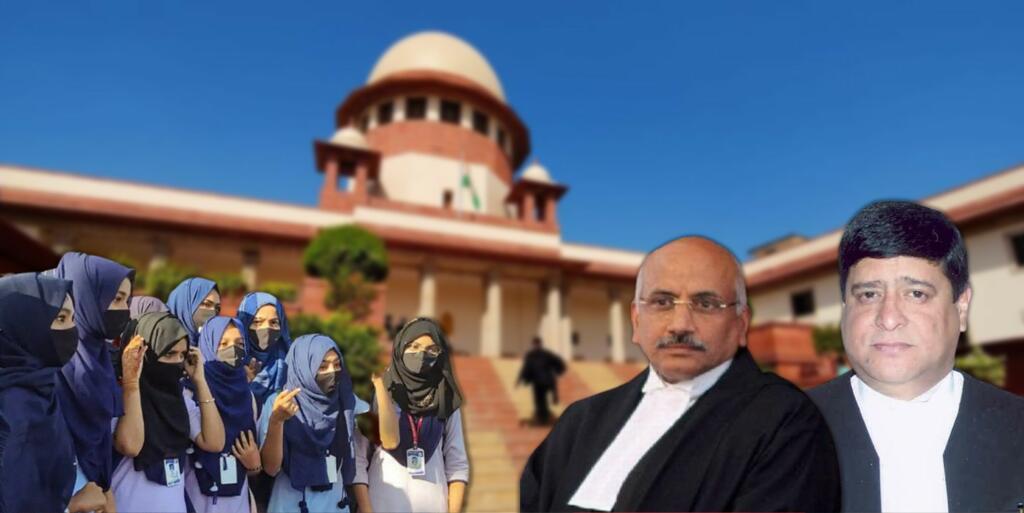There are some special kinds of communities in India, who have always given preference to their religion rather than the nation. For them, their personal laws carry higher value than the constitutional laws. They give preference to the medieval regressive theories of social construct rather than the modern one. This special character has deepened to such a level in The Democratic Republic of India that they have their own personal laws to govern them. In the social governance of the particular community, their medieval religious laws always prevail. The situation has reached such a level that they do not hesitate to challenge the modern rule of law developed with modern reasoning.
The SC Hit Burqa Gang Out of the Courtroom
While hearing a batch of 23 petitions seeking right to wear hijab for Muslim girl in public educational institutions, the Supreme Court bench, comprising of Justices Hemant Gupta and Sudhanshu Dhulia, posed some of the very uncomfortable questions to the petitioners.
Senior Advocate Rajeev Dhawan appearing for the petitioners argued that to decide whether headscarf was an essential religious practice or not, a constitutional bench should be formed under Article 145(3) (to hear substantial questions of law, the minimum number of Judges shall be five) of the Indian Constitution.
In response to that Justice Gupta replied, “while wearing of the scarf may or may not be an essential practice, the question could be as to whether the government could regulate the dress code?”
Advocate Rajeev Dhawan further argued that there were judges wearing tilak, pagdis etc.
Muffled by the argument, Justice Gupta said, “My grandfather used to wear it while practising law. Don’t equate it with religion…Our Preamble says ours is a secular country. In a secular country can you say that religious clothing has to be worn in a government run institution? This can be an argument”.
Back to Square One – Article 19, 21 and 25
In the continuation of hearing, the petitioners finally brought the foundational question of law. Arguing on behalf of petitioners, Senior Advocate Devadatt Kamat contended that Indian Constitution accepts Positive Secularism. Hence, the government must exercise reasonable accommodation in religious practices. Thus, aligning fundamental rights given under Article 19,21 and 25, Muslim girls should be allowed to wear Hijab in education institutions in addition to uniform.
Not convinced by the argument of fundamental rights, Justice Gupta stated, “It is not the question of violating other’s fundamental rights, the question is whether you have the fundamental right?”
In another point of argument, when petitioners’ counsel raised the fundamental rights of freedom of expression to wear a dress, Justice Gupta refuting the argument said, “I remember the news – a lady advocate came in a jeans and it was objected to saying you can’t wear jeans. But technically can the woman say you can’t bar me for wearing a jeans…If you go to a Golf Course, there is a dress code. Can you say I can wear the dress I like there?…In some restaurants, you have a formal dress code, in some you have a casual dress code.”
Read More: Hijab is not an essential practice of Islam : Karnataka High Court
Uniforms Promote Harmony
The present petition is the result of Karnataka High Court’s Judgement, in which the Court declared that Hijab is not an essential practice in Islam. The conflict raised, when on 5th February 2022, the Karnataka Government issued an order directing all schools and colleges in the State to follow Student Uniform. In consequence of the order, Hijab was banned in educational institutions. The issue in case was: –
- Whether Hijab is an Essential Religious Practice protected under Article 25 of the Constitution of India?
- Whether school uniforms are not legally permissible?
- Whether the Government Order of 5th February was issued without application of mind and is arbitrary?
The Karnataka High Court in its judgement observed that “The Holy Quran does not mandate wearing Hijab or headgear for Muslim women. Hijab at most means to gain access to public places and not a religious end itself. At the most, the practice of wearing this apparel may have something to do with culture but certainly not with religion.”
Further explaining the importance of uniform in school, the court observed that “No reasonable mind can imagine a school without a uniform. Uniform is not of a nascent origin. It is not that Mughals or Britishers brought it here. It has been there since the ancient Gurukul days. School uniforms promote harmony & spirit of common brotherhood transcending religious or sectional diversities.”
While the case has reached the Apex Court of the nation, the argument and issue remains the same. Does the government have power to regulate the dress code of the public institutions? Does Hijab constitute an essential religious practice of Islam? Can public morality prevail over religious morality? In the initial proceedings Justice Dhulia and Justice Gupta have cleared the fact that reasonability will always prevail over regressive religious bigotry in a secular state. The Apex Court has further sent a clear message to Burqa Gang that the state would be governed according to rule of law not rule of personal law. Personal laws should be kept in the personal sphere of life.
Support TFI:
Support us to strengthen the ‘Right’ ideology of cultural nationalism by purchasing the best quality garments from TFI-STORE.COM
